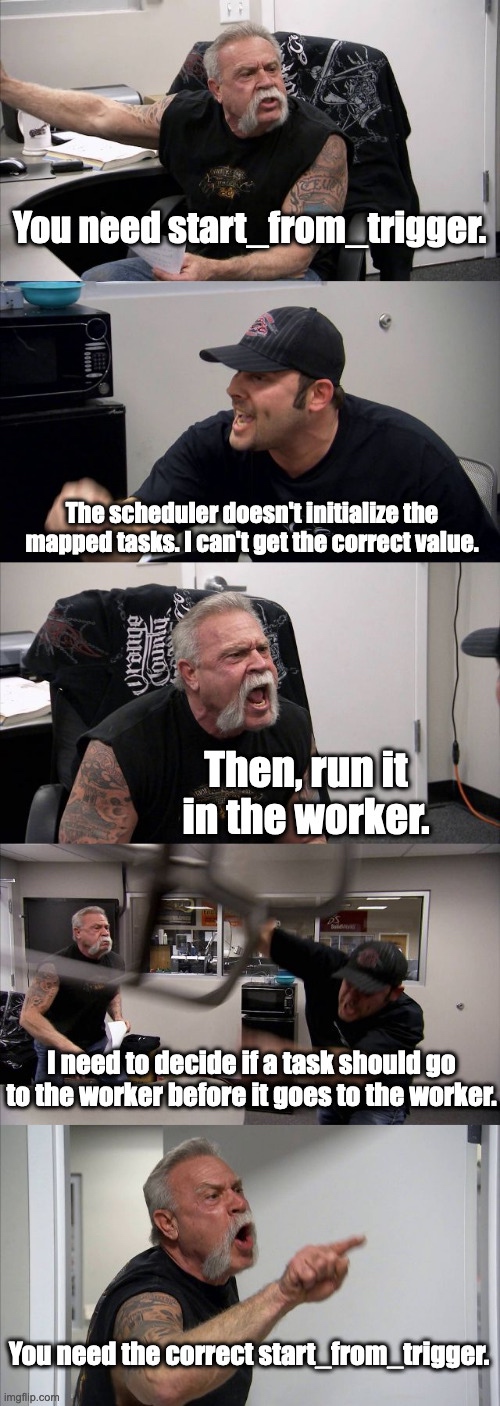As mentioned in the first article of this series, dynamic task mapping was not supported before this PR. However, it's now supported.
Well... partially
What is dynamic task mapping anyway?
In short, it's a way to define multiple tasks at runtime. For example,
with DAG(dag_id="dynamic_task_mapping", start_date=datetime(2022, 3, 4)) as dag:
@task
def sum(x: int, y: int, z: int):
return x + y + z
sum_values = sum.partial(y=10).expand(x=[1, 2], y=[300, 400])
will be interpreted as something like
sum(y=10, x=1, y=300)
sum(y=10, x=2, y=300)
sum(y=10, x=1, y=400)
sum(y=10, x=1, y=300)
There are three methods you can use
partial: add fixed valuesexpand: add values to expandexpand_kwargs: add values to expand but in bundles
The previous example can be modified to utilize expand_kwargs, and it will look like this
with DAG(dag_id="dynamic_task_mapping", start_date=datetime(2022, 3, 4)) as dag:
@task
def sum(x: int, y: int, z: int):
return x + y + z
sum_values = sum.partial(y=10).expand_kwargs(
[
{"x": 1, "y": 300},
{"x": 1, "y": 400},
{"x": 2, "y": 300},
{"x": 2, "y": 400},
]
)
For more details, please check Dynamic Task Mapping
Why can't it be supported directly?
If we look back to commit 25616424975 (one commit before this PR), the decision on whether a task should be sent to the worker of the triggerer is made in airflow/models/dagrun.py::DagRun::schedule_tis and it used start_from_trigger and start_trigger_args to do so. To visualize this, let's take a look at the following two flowcharts.
This is what Airflow did before the introduction of the "start execution from trigger" feature. We checked whether the task inherited from an EmptyOperator. If so, we marked it as a success. Otherwise, we added the task to the list of tasks to be scheduled.
---
title: Schedule a task (before start_from_trigger was introduced)
---
flowchart TD
start
is_empty{"inherit from
empty operator"}
dummy["mark as success"]
worker["add it to
schedulable tasks"]
start --> is_empty
is_empty --yes--> dummy
is_empty --noo--> worker
Now, we add an additional check to see if start_from_trigger is set to True to determine whether to delay this task at this stage.
---
title: Schedule a task (after start_from_trigger was introduced)
---
flowchart TD
start
is_empty{"inherit from
empty operator"}
dummy["mark as success"]
worker["add it to
schedulable tasks"]
start_from_trigger{"start_from_trigger
is True"}
trigger["defer the task
for the triggerer
to pick up"]
start --> is_empty
is_empty --yes--> dummy
is_empty --noo--> start_from_trigger
start_from_trigger --noo--> worker
start_from_trigger --yes--> trigger
style start_from_trigger color:#FFFFFF, stroke:#00C853, fill:#00C853
style trigger color:#FFFFFF, stroke:#00C853, fill:#00C853
The issue is that when tasks are mapped, the scheduler does not execute their __init__ method. We cannot determine the actual values of start_from_trigger and start_trigger_args until the task is initialized, which does not occur in the scheduler. If we only check these values at the class level, this feature becomes entirely useless, as we cannot map tasks with different values.
We are in a situation where we need these values to decide whether they should go to the worker or the triggerer, but we can only obtain them from the worker.

What can we do?
There's not much we can do unless we rewrite the entire dynamic task mapping feature in Airflow. The following is pretty much the only workaround available at the moment.
Let's go back to where we decide whether to defer or not. We implemented a new expand_start_from_trigger method and try to provide a way for the mapped operator to get start_from_trigger. For non-mapped operators, this method only returns self.start_from_trigger.
# check "start_trigger_args" to see whether the operator supports start execution from triggerer
# if so, we'll then check "start_from_trigger" to see whether this feature is turned on and defer
# this task.
# if not, we'll add this "ti" into "schedulable_ti_ids" and later execute it to run in the worker
elif ti.task.start_trigger_args is not None:
context = ti.get_template_context()
start_from_trigger = ti.task.expand_start_from_trigger(context=context, session=session)
if start_from_trigger:
ti.start_date = timezone.utcnow()
if ti.state != TaskInstanceState.UP_FOR_RESCHEDULE:
ti.try_number += 1
ti.defer_task(exception=None, session=session)
else:
schedulable_ti_ids.append((ti.task_id, ti.map_index))
For the mapped operator, it checks whether the argument start_from_trigger is passed through partial, expand, and expand_kwargs (the methods you need to use dynamic task mapping as mentioned in the "What is dynamic task mapping anyway?" section). If so, we'll use this value to decide whether to defer the task.
def expand_start_from_trigger(self, *, context: Context, session: Session) -> bool:
"""
Get the start_from_trigger value of the current abstract operator.
MappedOperator uses this to unmap start_from_trigger to decide whether to start the task
execution directly from triggerer.
:meta private:
"""
# start_from_trigger only makes sense when start_trigger_args exists.
if not self.start_trigger_args:
return False
mapped_kwargs, _ = self._expand_mapped_kwargs(context, session, include_xcom=False)
if self._disallow_kwargs_override:
prevent_duplicates(
self.partial_kwargs,
mapped_kwargs,
fail_reason="unmappable or already specified",
)
# Ordering is significant; mapped kwargs should override partial ones.
return mapped_kwargs.get(
"start_from_trigger", self.partial_kwargs.get("start_from_trigger", self.start_from_trigger)
)
Note that the argument name must be the same to take effect. If you're doing something like
def __init__(self, sft: bool):
self.start_from_trigger = sft
It won't take effect as the mapped operator won't run __init__ at that stage.
As for self.start_trigger_args, we're doing something similar. After we have already decided we want to defer the task, we use the newly added expand_start_trigger_args method to get the value needed here
One last thing to note is that we're not resolving XCom for these 2 values.
So how can we use it?
I intentionally don't include a table of contents in this article, and it starts with how this feature works under the hood instead of how to use it. If you don’t know if you need to combine this feature with dynamic task mapping, you don't.

This feature has some limitations. The syntax is slightly different from standard dynamic task mapping, which makes it easy to go wrong. Also, it does not resolve XCom when trying to expand start_from_trigger and .start_trigger_arg, which makes this feature less powerful.
Unless you know the risk and the difference between it and dynamic task mapping on standard operators.

Warning: Proceed at your own risk.
First, you'll need to define arguments trigger_kwargs explicitly and start_from_trigger in the __init__ method so Airflow can expand it in the scheduler.
class WaitHoursSensor(BaseSensorOperator):
start_trigger_args = StartTriggerArgs(
trigger_cls="airflow.triggers.temporal.TimeDeltaTrigger",
trigger_kwargs={"moment": timedelta(hours=1)},
next_method="execute_complete",
next_kwargs=None,
timeout=None,
)
def __init__(
self,
*args: list[Any],
trigger_kwargs: dict[str, Any] | None,
start_from_trigger: bool,
**kwargs: dict[str, Any],
) -> None:
# This whole method will be skipped during dynamic task mapping.
super().__init__(*args, **kwargs)
self.start_trigger_args.trigger_kwargs = trigger_kwargs
self.start_from_trigger = start_from_trigger
def execute_complete(self, context: Context, event: dict[str, Any] | None = None) -> None:
# We have no more work to do here. Mark as complete.
return
When defining the task, you need to pass start_from_trigger or trigger_kwargs to the partial, expand, or expand_kwargs method. The name needs to be precisely the same.
wait_hours_task = WaitHoursSensor.partial(task_id="wait_for_n_hours", start_from_trigger=True).expand(
trigger_kwargs=[{"hours": 1}, {"hours": 2}]
)
The entire __init__ method will be disregarded before the task starts. The scheduler uses the values provided in these methods and saves them as a trigger row in the metadata database for the triggerer to pick up. Once the task is finished in the triggerer, it goes back to the scheduler and then gets assigned to a worker to execute the next method. The __init__ method will be run before the next method is executed.

